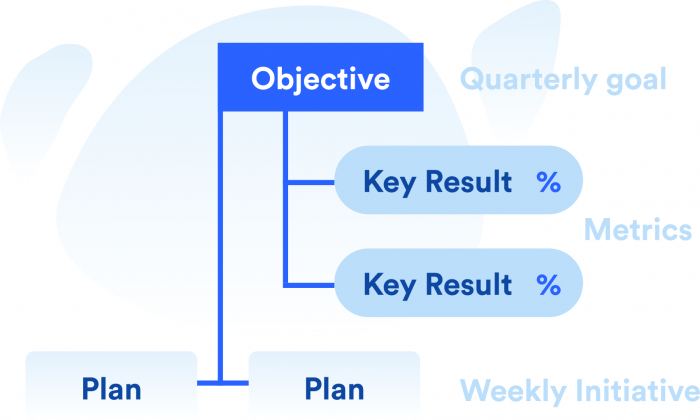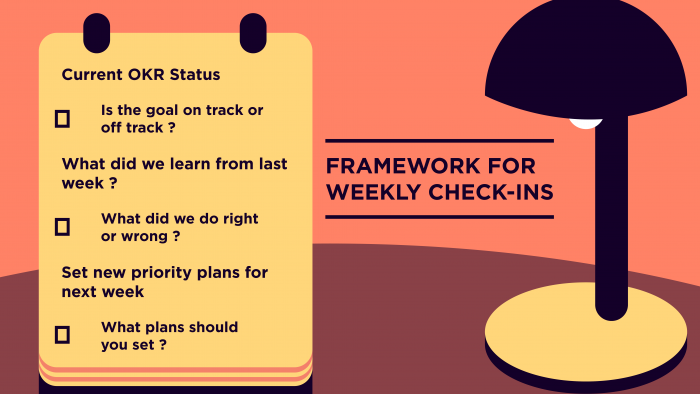The OKR goal-setting methodology helps teams focus on any areas that need improvement. This is especially crucial as the world of work changes. More businesses than ever have had to make the jump to virtual and remote work. While working remotely it is easy to feel isolated, but OKRs offer a way to keep your team aligned and focused even if everyone is working from home. It gives an overarching mission that helps people define their daily and weekly actions inline with it.
In this article, we will teach you about OKR implementation in a remote team or company and the practical things you need to do to make sure you succeed.
What are OKRs?
OKRs (Objectives & Key Results) is a goal-setting system that helps everyone focus on what needs to be improved at the company and team levels. The O stands for Objectives. These are your committed or aspirational goals. These goals can be about growth, change, or innovation. For example, the Objective could be to Increase customer engagement.
From there you have to set your Key Results which are the measurable outcomes that define what success of the Objective looks like. An example Key Result could then be to Increase average customer likes on our posts from average of 28 to 60. To accomplish your OKRs you will need to set and execute different plans and initiatives and then later evaluate their success with your Key Results. If OKRs are new for you then here is one site explaining OKRs more in-depth.

Also, if you are want to get moving with OKRs right away then Weekdone may be a good option for you. Our subscription includes free OKR training, onboarding, and support (personal OKR methodology & Weekdone training sessions, Q&A sessions for your team, OKR reviews, and consultations). You can learn more about our personalized OKR onboarding here.
What are the benefits of OKRs for the remote team?

While your team is working remotely it might be challenging to have an overview of whats going on. Everyone is working separately from home and now finding ways how to align what the team is doing might be more important than ever. At the same time, a lot of businesses future is unknown and we have to be ready to adapt to changes. OKRs can help you to overcome both of these challenges.
OKR can help you do learn and adapt changes fast
It’s no secret that we are in a situation where a lot of companies are facing difficult times and even chance of going out of business. The world is changing and to survive the companies need to be fast learning and capable of adapting to changes fast. That might mean a lot of restructuring in work processes or even how the business model works. At the same time, we are facing new problems that leave a high need for innovation to offer solutions. Every new idea needs testing.
OKRs are set quarterly and there should be Team Weekly OKR Check-in to evaluate the progress. That means that the learning circle is quite fast and it’s possible to do changes quickly if something isn’t delivering the results. Focusing on measuring outcomes helps also to make sure that those decisions are data-driven, they base on facts not just on someone’s opinion.
I think we don’t have much room for just going with someone’s opinion and after a lot of effort has been put in finding out that it was a bad choice. OKRs focus on the areas that need improvement and if each team member puts in the effort great things might be achieved.
OKRs help to align and prioritize what the team is doing
Working remotely might come hard to some teams if they aren’t used to it. Even working in office transparency and unity might be difficult from time to time. OKRs should be set and executed together with the team. Even though people might play a slightly different role in each goal and the tasks that they do might be individual and separate from others than with OKRs the end goal is still the same.
While being isolated from each other having common Team goals help people to feel less confused and might boost their motivation. OKRs set the priorities which means whenever the team or individuals are evaluating which tasks to take and which to leave aside then they can make those decisions easily based on set OKRs.
That means the team might save a lot of time! Long discussions over every new project or task are not needed, it’s simple – if it helps to achieve the Objective then it will be executed and if not then not.
People need direction to have some clarity and OKRs give it
Working from home has its own challenges on an individual level. It might be already hard to figure out how successfully work in the home environment and a lot of things might create confusion. The more clarity there is the better. As mentioned above, OKRs help to set priorities thus the direction of the team. If we know where we are going it calms as down and offers some sense of security.
Seeing real results and giving ownership motivates the team
If the OKRs are set well, focusing on the areas that need improving and the Key Results are really measurable outcomes, then seeing real progress and improvements happening might motivate the team quite a lot. It gives a new meaning to the things they are doing. The OKRs should also be set together with a team which means there is a place for their opinion.
You can ask people to come up with their ideas, asking what they think about what areas are problematic or bringing the team results down and later evaluate all the ideas together. This sharing of ideas and tackling of issues together is one of the most important things OKRs brings to the table. You might be surprised by what great ideas will be brought to the table. If people have to say in the goals, it makes them more theirs and they are motivated to work on them.
OKRs help managers to have a better overview of how and what the team is doing
Key Results help to evaluate what is brining results and whatnot that means even though the manager might have less control over what people are doing remotely then it’s easy to see if they are working on the right things or not.
During the Weekly OKR Check-ins, people can report what they have been up to, what kind of challenges they had, what did they learn from it and what they will work on next. Whatever isn’t working can be set aside and the manager can breathe more easily knowing that the team is working on the right things and acting fast to change if not.
How to implement OKRs while working remotely

OKRs might be implemented just in one or two teams in the company as a pilot or the whole company might start with the new goal-setting methodology together. Depending on that the process starts differently. In situations where very fast-acting is needed it might be a bit hard and slow to get the whole company onboarded together.
Our post is focusing on implementing OKRs with remote teams where fewer conversations and decision-making is needed to get started.
Start by introducing OKR methodology to your team
First, everybody should understand what the OKR methodology is about and how this helps to organize your teamwork better. It’s important that they see the benefits to feel engaged with the set OKRs.
Also, later in this post, we are covering some common mistakes like KR not being measurable but task-based which means you are not setting OKRs but doing project management. If people don’t understand the methodology it’s hard to set OKRs that help the team to improve.
Brainstorm OKR ideas
Ask each team member individually to come up with some OKR ideas that could be taken up for discussions. They don’t have to set the OKRs yet, just their opinion on what areas need change, growth or innovation.
Some questions that might help get the thinking going:
- Are we facing any problems that should be solved?
- Is our process working as we wish (speed, quality, delivering results, etc)?
- What could be changed to have better results as a team?
- Are we working on something big and need to maybe set OKRs to measure the wished quality or impact of it?
- Do we need to work on improving our team competences?
- Do we need to maybe research something to know our product/market/customers/partners etc better?
It’s important that everybody understands that there are no right and wrong answers here. No idea should be judged. Of course, not all things can be executed at the same time but that doesn’t mean that the idea was bad, just maybe not the right time for it.
Have a team meeting to set your OKRs
When everybody has their ideas ready set up a web conference call to discuss the ideas. It would be good if all the ideas are sent to the manager beforehand and shared with everybody else on the team. This way people can be better prepared and the meeting can go faster. If possible set also some criteria based on what you will rate the ideas, it makes the decision-making easier.
For example, the effort needed, the range of impact, importance on company level (helps with company strategic goals), confidence in succeeding, the importance for the team, etc. You can rate each goal and then see what gets the biggest score. Or you can just discuss all the ideas and choose the ones with voting etc.
Once you have chosen the areas you are going to work on, phrase inspirational and understandable Objectives. For example, “Improve our marketing channels” or “Improve our mail campaign to onboard users better”.
After setting the Objectives you should work on finding the measurable outcomes that help you to define when you have achieved the Objective. This doesn’t have to be done all with one meeting. If needed let people digest the Objectives and draft some Key Results ideas and then have another meeting. OKRs set the direction for upcoming months if you are not yet sure you got your OKRs right then take the time needed.
Execute your OKRs
Setting the goals is just the first part, you also need to work on the weekly bases to make them happen. Agree on the weekly process with the team so everybody would know how working with OKRs will look like. Also, agree and share the responsibilities, roles and communicate what is expected from the team
Best practice weekly process to execute OKRs:
- During the team Weekly meeting have OKR weekly Check-in, read about in here. What OKR generally covers is:
- Current OKR situation. How are we doing?
- What team members were up to and what did we learn from last week?
- Set new priority Plans for next week and also set who will be doing them
- Update the Team OKRs on the go
- At the end of the week ask team members to report their weekly doings. Weekdone’s Weekly Planning system is perfect for that.

Review, discuss and learn
Learning should go with the OKR process on every step on the way. Weekly Check-ins play a crucial part in it. The lessons learned might be the most valuable part of OKRs! Sometimes we might now achieve any great success in percent wise but if the team gained a lot of new knowledge and has grown because of it I think we can call it a success.
The main goal is to improve and we should be open-minded about it, maybe we didn’t improve that certain OKR but we improved something else. We can this new knowledge with us to the next quarter and use it for a good purpose.
End of the quarter there should be a review looking back to everything was done, achieved and learned.
Some questions to discuss as a team:
- How did the team generally perform?
- How was the Quality of the OKRs set? Did they help the team to make some improvements?
- If we “failed” percent wise then why? What did we learn from it?
- What were the major challenges?
- Lessons learned – What can we do better next time?
- Ideas for next quarter based on lessons learned.
And now, once the quarter is finished, you can start again choosing the new areas to work and improve!
Biggest challenges to avoid

Key Results not being measurable which means it might be still just project management what the team is doing. The team can still continue with project management as well but it’s not the same as OKR which should be above the projects. OKRs set priorities and define how the success looks like and you will try different projects (plans/tasks) and later measure the results. OKRs are fixed but the actions might need changing if the progress isn’t delivered. Don’t change the goal, just how you get there.
Team members are not involved in the OKR setting process which might mean they don’t either understand the importance of those goals or just don’t engage as much as needed because those goals don’t feel like theirs. You can use different web conference platforms to run meetings to discuss OKRs. To make sure people are better prepared let them know in advance and ask them to come up with some OKR topic ideas. Take all the ideas up for discussion!
Too many OKRs! It overwhelms the team and the more OKRs you have the less focus you have. There definitely shouldn’t be more than 5 OKRs per team but depending on a Team size, difficulty of the goals (committed vs aspirational), etc it might already be too much. For example, we have discovered that 2-3 OKRs are our maximum for our team (3 team members). If we set more then we achieve a lot less with everything and that shouldn’t be the case.
No regular OKR Check-ins. Now when everybody is working remotely and having fewer opportunities to chat then in office the regular Check-in is more crucial than ever. Make sure that you have a weekly process in place and people really follow it.
No transparency of what people are doing. If people are working remotely it might be harder to see what they are doing. OKR check-ins give some transparency but you can’t discuss everything they have been up to without meeting ending up too long. Some things might be just reported for people to know and don’t need much discussion.
For example, you could use Weekdone’s Weekly Check-in to ask members to report their PPP (plans, progress, and problems) and they could interact with each other’s weekly items in Newsfeed. This way everybody is aware of what’s going on all the time and meetings can be used to discuss high-level things.
Taking action
Managing a remote team and implementing OKRs each have their own challenges. While it may seem like too many problems to worry about at once, many of the problems that remote work creates can be easily solved by OKRs. This makes it the perfect methodological tool for almost any team.
But it is important to do OKRs right from the start, careful onboarding and implementation can prevent any small problems from snowballing into bigger ones. Implementing an OKR software like Weekdone can make the process even smoother with their free OKR coaching and onboarding assistance. It is free for up to 3 users and you can start a free 14-day trial if your team is bigger than that. So check it out and make OKRs work for your remote team.
